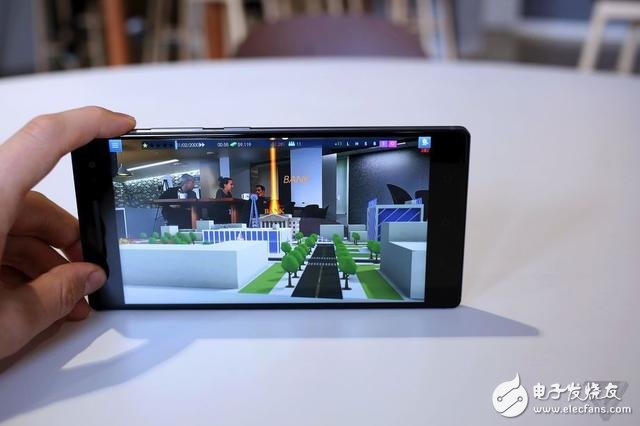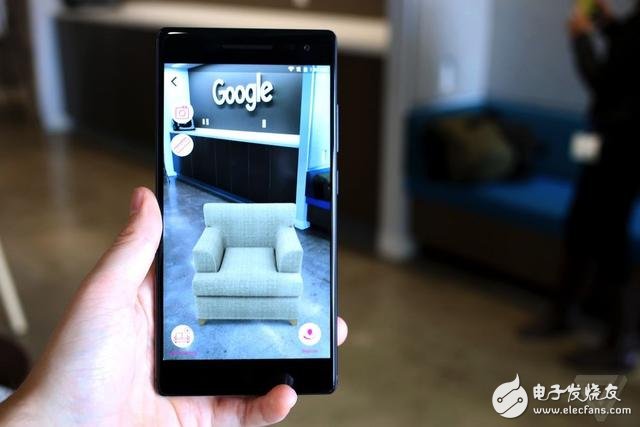Without the global fever of Pokemon Go, maybe augmented reality technology has been forgotten by many people. After all, compared with virtual reality, augmented reality is not much attention. With the rise of Pokemon Go, this augmented reality game developed by Google's former subsidiary NianTIc Labs has now accumulated tens of millions of users worldwide. A few months after the launch of Pokemon Go, a smartphone based on augmented reality technology has officially started shipping. That's right, it's Lenovo's Phab 2 Pro, which contains the necessary hardware and Google's Tango AR technology.
In fact, the rise of Pokemon Go has not accelerated the development of the Tango project. The team has been working with Lenovo since last year to develop the Phab 2 Pro smartphone. "In fact, the popularity of Pokemon Go is beyond everyone's expectations, including NianTIc itself." Tango project leader Johnny Lee said at a roundtable last week. “Pokemon Go makes it easier for us to find partners and let more people start accepting augmented reality.â€
Jokes are jokes. Lee thinks that the game is just an initial stage of the practical application of augmented reality. Although Pokemon Go is very influential, it doesn't have much technical content. It walks outside through map data and then faces the virtual cartoon characters. Taking pictures, this is really simple. NianTIc shows how technology can be used to allow users to interact with virtual elements in the real world. “Not only is physical space interaction, Tango technology can even allow different people to communicate through geo-tracking,†says Lee.

The Phab 2 Pro is now available for sale at $499 (approximately RMB 3,370). Both Google and Lenovo hope to prove that the future based on augmented reality technology will become an inseparable technology in modern smartphones. Lee believes that Tango will be as important as GPS positioning in the future, will change the way smartphones are used, and even change our lives like Uber. If our smartphones understand the physical space and the world we see in augmented reality, then it will redefine many industries, from games to retail to real estate sales.
In the long run, Phab 2 Pro and Tango are a product between Microsoft's $3,000 (about RMB 20,265) HoloLens and the free Pokemon Go. The Tango team hopes to create something in between. In the middle, whether hardware or software, Phab 2 Pro will be the hallmark of Tango.

It's worth noting that Lee's part has successfully developed a real tablet phone from the development kit in the past two years, but the number of applications based on augmented reality technology is still very limited, and most of them are It is built around the form of the game, such as turning the living room of the home into a virtual game space through the camera and sensor. But Google hopes that Tango can be used in more fields and devices. Lee said that next year, more devices will be available, not just Lenovo's Phab 2 Pro, and not just based on 3D maps.
But before that, we still have to rely on Phab 2 Pro, which is indeed a very good smartphone, although in the eyes of most smartphone users, it is not eye-catching, and the price of $500 is better than the iPhone. It's a lot cheaper than Pixel. However, the Phab 2 Pro is equipped with a 6.4-inch display, which is almost difficult to operate with one hand, and even difficult to put in your pocket. It seems that many games and apps based on augmented reality technology in the future should consider the special attributes brought by the big screen Phab 2 Pro.
However, Lenovo and Google understand that Phab 2 Pro is only used to prove the representative of the Tango project, so sales will basically only be a few million. In the use of Phab 2 Pro, we can use our large screen and powerful camera to make our room cover some virtual elements that we need. Many of the early Tango project apps were controlled by gestures, preventing users from actually having to manually manipulate the 5.4-inch screen. With this gesture, we don't have any occlusion on the Phab 2 Pro's screen, which makes it easier to operate.
I tried some apps developed specifically for the Tango project in Google's app store, and some are even part of the Google Incubator program. Including a game developed by Mattel Hot Wheels, this is a racing game. Of course, there is the Slingshot slingshot game developed by Sockethead Games, which creates a virtual island in the center of the room, and we need to use a slingshot to attack the target on the island, which is similar to Angry Birds.
There is also a Towers for Tango, a simulation game that hires workers to build apartments in front of virtual targets and promotes the economics of virtual cities. The whole game is relatively simple, and the gimmick is heavy, but the use of augmented reality technology is still very worthy of recognition. The most striking thing is to view the real world through a 3D camera and force the user to move constantly. Obviously, augmented reality technology, like virtual reality technology, allows users to move and interact with other objects in the room.
There are currently 35 apps dedicated to the Tango project, but to be honest there are few examples of practical significance. It includes tools developed by Autodesk and Lowe that are similar to virtual home and appliance placement measurements. Although these apps seem to be "boring" at the moment, they show the potential value of augmented reality technology. If integrated with 3D technology, the future will change the way companies do business. Imagine if you are planning to buy a new sofa, then take a picture directly in the living room at home, and then put the virtual sofa in the living room to simulate the effect. Is it necessary to run the mall without the customer?
In the future, products that support Tango technology will be available. At least next year, although it seems more like a technology that is still in the testing stage, developers are full of confidence. I believe that in addition to the mobile experience AR experience app like Pokemon Go, there will be a broader prospect for the future use of 3D map data.
Solar Inverter,Centralized Inverter,Off-Grid Inverter,Grid -Connected Inverter
Fuzhou Mei Li Cheng Imp&Exp Co., Ltd , https://www.mlc-solar.com